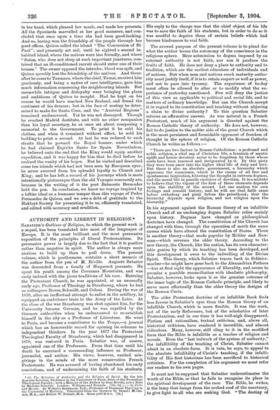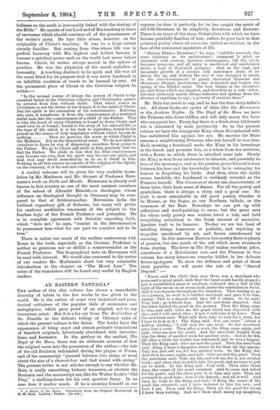AUTHORITY AND LIBERTY IN RELIGION.*
SABLTIER'S Outlines of Religion, to which the present work is a sequel, has been translated into most of the languages of Europe. It is the most brilliant and the most persuasive exposition of the principles of liberal Protestantism. Its persuasive power is largely due to the fact that it is positive rather than negative in spirit. The author is always more anxious to build up than to pull down. The present volume, which is posthumous, contains a short memoir of the author from the pen of M. Revile. Auguste Sabatier was descended from a family of Huguenot peasants. He spent his youth among the Cevennes Mountains, and was early imbued with the pious traditions of his race. Entering the Protestant Church, he was appointed, at an unusually early age, Professor of Theology in Strasbourg, where he had as colleagues Reuss, Schmidt, and Colani. During the war of 1870, after an ineffectual attempt to enlist in the artillery, he equipped an ambulance train in the Army of the Loire. At the close of the war Strasbourg was shut against him, for the University became German, and he was expelled by the German authorities when he endeavoured to re-establish himself in the city as a Professor of Literature. He went to Paris, and became a contributor to the Temps,—a journal which has an honourable record for opening its columns to independent thinkers. In the year 1877 the Protestant Theological Faculty of Strasbourg, which had disappeared in 1870, was restored in Paris. Sabatier was, of course, appointed one of the Professors. From that time until his death he exercised a commanding influence as Professor, journalist, and author. His views, however, excited mis- givings in the minds of the more conservative French Protestants. He was accused of having abandoned his early convictions, and of undermining the faith of his students.
• (1) The Religions of Authority and the Religion of Spirit. By the late Auguste Sabatier, Professor in the University of Paris, Dean of the Protestant Theological Faculty ; with a Memoir of the Author by Jean Wyllie, and a Note by Madame Sabatier. London : Williams and Norgate. 1108. Od. J—(2) Faith and Morals. By Wilhelm Herrmann, D.D., Professor of Dogmatic Theology In the University of Marburg. Translated from the German by Donald M Ithe- son, M.A., and Robert W. Stenart,.M.A. Same pubFetem. [Se.]
His reply to the charge was that the chief object of his life was to save the faith of his students, but in order to do so it was needful to deprive them of certain beliefs which had become hindrances to real faith.
The avowed purpose of the present volume is to plead for what the author terms the autonomy of the conscience in the religious sphere. Mere submission to dogma imposed by an external authority is not faith, nor can it produce the fruits of faith. He does not deny a place to authority and to tradition, which are the earliest educators of individuals and of nations. But when men and nations reach maturity autho- rity must justify itself, if it is to retain respect as well as power, and not to pass into tyranny. The experience of to-day must often be allowed to alter or to modify what the ex- perience of yesterday sanctioned. Few will deny the justice of this view as applicable to political and social life, and to matters of ordinary knowledge. But can the Church accept it in regard to its constitution and teaching without abjuring a claim to divine authority ? To this question Sabatier returns an affirmative answer. As was natural in a French Protestant, much of his argument is directed against the Roman Catholic theory of authority. He does not, however, fail to do justice to the nobler side of the great Church which is the most persistent and formidable opponent of freedom of thought in the sphere of religion. Of the Roman Catholic Church he writes as follows :—
" There are two factors in Roman Catholicism : a profound and noble religion, a vital sap of Christian life, a fountain of mystic uplift and heroic devotion never to be forgotten by those whose souls have been renewed and invigorated by it. By this piety they were born anew into the higher ideal life of duty and love. But there is also an absolute government, a hierarchy which oppresses the conscience, which is the enemy of all free and spontaneous inspiration, fettering the thought in outworn dogmas, and the moral life in puerile exercises of devotion. It is a mistake to believe that the vigour of the first of these elements depends upon the stability of the second. Let one analyse his own feelings and consult history, and he will see that faith came before orthodoxy and piety before the priesthood; that the hierarchy depends upon religion, and not religion upon the hierarchy."
In his argument against the Roman theory of an infallible Church and of an unchanging dogma Sabatier relies mainly upon history. Dogmas have changed as philosophical doctrines have changed. The constitution of the Church has changed with time, through the operation of much the same causes which have altered the constitution of States. There is another theory—that made popular by Mohler and New- man—which reverses the older theory. According to the new theory, the Church, like the nation, has its own character- istic genius by which its teaching has been developed, and this development it owes to the indwelling of the Divine Spirit. This theory, which Sabatier traces back to Schleier. macher—he might have gone back to the Alexandrian Fathers —has at first sight the appearance of liberality, and seems to promise a possible reconciliation with idealistic philosophy. Sabatier, however, looks upon it as the genuine outcome of the inner logic of the Roman Catholic principle, and likely to serve more effectually than the older theory the designs of the Roman Curia.
The older Protestant doctrine of an infallible Book finds less favour in Sabatier's eyes than the Roman theory of an infallible Church, which is more flexible. It was the work, not of the early Reformers, but of the scholastics of later Protestantism, and in our time it has well-nigh disappeared.
Pietism and rationalism, textual criticism, and, above all, historical criticism, have rendered it incredible, and almost ridiculous Many, however, still cling to it in the modified form that the Bible is infallible as a teacher of religion and morals. Even the "last bulwark of the system of authority," the infallibility of the teaching of Christ, Sabatier cannot admit in an absolute form. It is vain, he says, to appeal to the absolute infallibility of Christ's teaching, if the infalli- bility of His first historians has been sacrificed to historical criticism. For the completion of his argument we must refer our readers to his own pages.
It must not be supposed that Sabatier underestimates the worth of the Bible, or that he fails to recognise its place in the spiritual development of the race. The Bible, he writes, is the lamp that hangs from the arched roof of the sanctuary, to give light to all who are seeking God. "The destiny of
holiness on the earth is irrevocably linked with the destiny of the Bible." He speaks of our Lord and of His teaching in tones of reverence which should convince all of the genuineness of the writer's piety. He lays little stress, however, on the originality of Christ's teaching. It was to a large extent already familiar. But coming from One whose life was in perfect harmony with His highest and holiest lessons, it became a spiritual power such as the world had never before known. Christ, he writes, always moved in the sphere of practice. He was the physician of the moral maladies of humanity. A teaching destined to be spirit and life was all the more fitted for its purpose that it was never hardened in an infallible tradition of words to be learned by rote. Of the permanent place of Christ in the Christian religion he writes :—
"In the normal course of things the person of Christ is the essential factor in the Christian religion, and Christianity cannot be severed from him without death. That which makes us Christians is not the letter of the Gospel, it is the spirit of Christ. But the spirit is the emanation of his consciousness. Entering into ours, it transforms it from the consciousness of a wretched sinful man into the consciousness of a child of the Father. This is why the heart of every Christian is bound to Jesus Christ, and must ever be so bound; bound to the story of his outward life as the type of life which it is his task to reproduce, bound to his person as the source of holy inspiration without which he can do
nothing Then we perceive the sense in which Christ is the Mediator. Not in the hierarchical sense. We do not address ourselves to Jesus by way of dispensing ourselves from going to the Father. We go to Christ and abide in him, precisely that we find the Father. We abide in him that his filial consciousness may become our own, that his spirit may become our spirit, and that God may dwell immediately in us as it dwelt in him. Nothing in all this carries us outside of the religion of the Spirit; on the contrary, it is its seal and confirmation."
A cordial welcome will be given the very readable trans- lation by Mr. Matheson and Mr. Steuart of Professor Herr- mann's work on Faith and Morals. Herrmann is already well known in this country as one of the most eminent members of the school of Albrecht Ritsch1,—a theologian whose influence on theological thought in Germany may be com- pared to that of Schleiermacher. Herrmann lacks the brilliant expository gift of Sabatier, but many will prefer his cautious meditative treatment of the subject to the fearless logic of the French Professor and journalist. He is in complete agreement with Sabatier regarding faith, which "does not," he says, "consist in the determination to pronounce true what for our part we conceive not to be true."
There is rather too much of the endless controversy with Rome in the book, especially as the German Professor is neither so generous nor so skilful a controversialist as the French Professor. The biographical note on Herrmann will be read with interest. We would also commend to the notice of our readers Mr. Matheson's short but very admirable introduction to the chapter on "The Moral Law." The notes of the translators will be found very useful by English







































 Previous page
Previous page